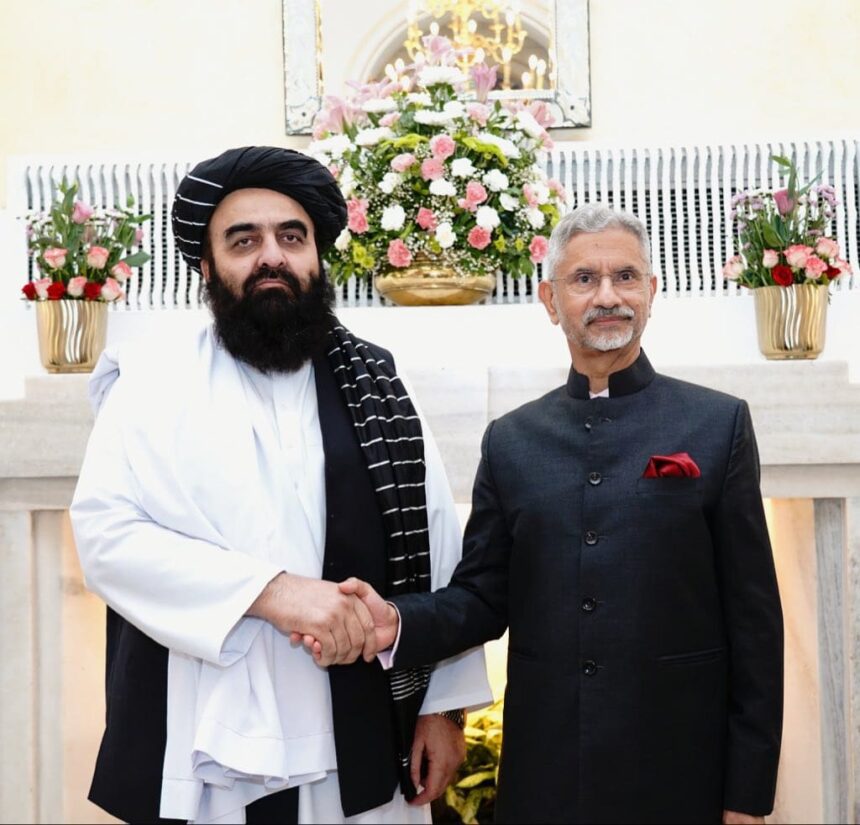After the exclusion of women journalists from a briefing by Afghanistan’s Foreign Minister Amir Khan Muttaqi during his diplomatic visit to India, the Ministry of External Affairs (MEA) faced significant backlash. The MEA clarified, stating, “MEA had no involvement in the press interaction held yesterday by Afghanistan’s Foreign Minister, Amir Khan Muttaqi, in Delhi.”
The briefing, which became a focal point of controversy, did not allow any women journalists to attend. This incident ignited outrage across media, political circles, and social media in India, prompting many to describe it as “unacceptable” and a “violation of all our laws and values,” as well as a “surrender of India’s long-cherished commitment to equality.”
Congress MP Priyanka Gandhi Vadra urged Prime Minister Narendra Modi to clarify his stance on the exclusion of female journalists from the press conference of the Taliban representative during his visit. She stated, “If your recognition of women’s rights isn’t just convenient posturing from one election to the next, then how has this insult to some of India’s most competent women been allowed in our country, a country whose women are its backbone and its pride?”
Communist Party of India General Secretary D. Raja condemned the exclusion, asserting, “The Republic of India is built on equality. To allow such exclusion here is blasphemy to our constitutional spirit.” He demanded an explanation from the MEA on the decision to permit this “discriminatory spectacle,” emphasizing that it nourishes a patriarchal ideology.
Congress leader Jairam Ramesh expressed his shock, noting that the government’s acceptance of this situation, especially on the eve of the International Day of the Girl Child, was “shocking and unacceptable.”
RJD MP Manoj Kumar Jha criticized the exclusion, arguing that it undermined India’s moral and diplomatic standing. He affirmed that the incident was “not just a procedural lapse but a symbolic surrender of India’s long-cherished commitment to equality, freedom of the press, and gender justice,” highlighting the disappointing message it sends to Indian women and the global community.
Trinamool Congress MP Sagarika Ghose labeled the incident as “UNACCEPTABLE and HATEFUL,” asserting that it was not a sign of smart diplomacy but rather a weakness on the part of the Modi government.
Saket Gokhale, another MP, characterized the government’s actions as “pathetic.” He called for Foreign Minister S. Jaishankar to apologize to the women journalists affected, describing the government’s acceptance of such dictates as a failure of sovereignty.
Journalist Rana Ayyub expressed her surprise that male journalists did not show solidarity by walking out of the briefing, suggesting this could have sent a powerful message. Journalist Sarayu Pani emphasized that the Taliban should not dictate terms during a state visit to India and criticized the Indian government for allowing women’s dignity to be disregarded for diplomatic reasons.
The exclusion reflects the Taliban’s broader policies, which have faced global condemnation for restricting women’s education, employment, and public participation. Amir Khan Muttaqi’s visit to India from October 9 to 16 marks the first high-level delegation from Kabul since the Taliban took control of Afghanistan in August 2021, following the U.S. withdrawal and the downfall of the previous government.
During his visit, Muttaqi met with External Affairs Minister S. Jaishankar to discuss cooperative efforts to improve ties. India has since elevated its technical mission in Kabul to a full-fledged embassy and announced several new projects for Afghanistan as part of ongoing healthcare cooperation.
Tags: women journalists, Afghan FM, media briefing, outrage, MEA involvement
Hashtags: #Women #journalists #exclusion #Afghan #FMs #media #briefing #sparks #outrage #MEA #involvement










